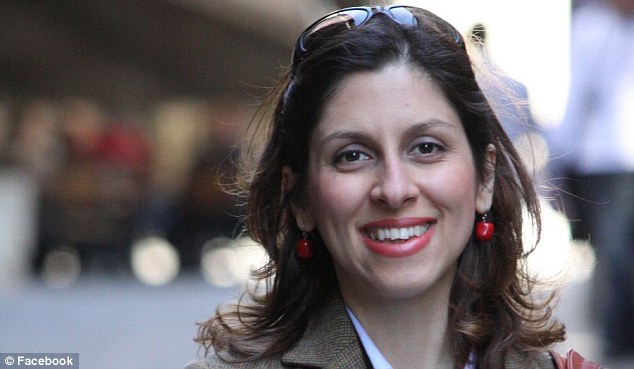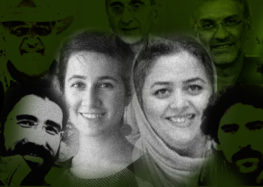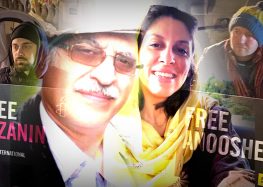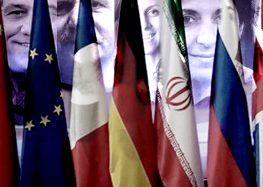Husband of Iranian-British Citizen Held in Iran Calls Her Detainment “Outrageous” and “Cruel”

“I have no idea how a young woman with a baby could be a danger to national security.”
The husband of Nazanin Zaghari-Ratcliffe, a British-Iranian dual citizen who has been detained in Iran without legal representation for more than five weeks, has expressed dismay at his wife’s detainment and the authorities’ refusal to allow her access to counsel, to announce the charges under which she is being held, or to allow her family visits throughout this period.
In an interview with the International Campaign for Human Rights in Iran, Richard Ratcliffe said that his wife’s family was informed only today, May 10, that they will be allowed to visit with her where she is being held in Kerman.
Ratcliffe noted that there was never any indication that his wife was being monitored during the past three visits she made to Iran in the last five years.
“During the times she visited Iran she had never been summoned. She had never received any indication that she was under scrutiny,” Ratcliffe told the Campaign. “She is not political and she is not an activist. She stayed out of trouble. I don’t think actually that anyone in her immediate family has ever been in trouble.”
Nazanin Zaghari-Ratcliffe, a 37-year-old project manager with the Thomson Reuters Foundation, the news agency’s charitable arm, travelled to Iran on March 17 to visit her family during the Persian New Year. She was arrested at the Imam Khomeini Airport with her 22-month old daughter, Gabriella, on April 3, 2016.
Richard Ratcliffe told the Campaign that to the best of his knowledge his wife was arrested by Iran’s Revolutionary Guards and remained in their custody.
The baby, who does not hold Iranian citizenship, is currently under the care of her maternal grandparents in Tehran, with her passport confiscated.
“When she was first arrested we didn’t know who took her. After 10 days, someone telephoned her father to confirm that she was in Kerman [643 miles south of Tehran] and that they had her… [her parents] didn’t know which organization it was or exactly where, but after approximately three weeks someone telephoned to say we [the Revolutionary Guards] have her for ‘national security [reasons],’” said Ratcliffe, a British accountant.
Ratcliffe, who has not had contact with his wife or daughter for nearly two months and has been advised not to travel to Iran, said he is unaware of any official charges, but thinks they could be announced soon because the number of interrogations his wife is being subjected to appears to be decreasing.
“There are still no charges. It’s still not clear. I can speculate that, it feels like in the beginning there were lots of interrogations. There aren’t that much more interrogations and that might mean that the charges are coming through,” he said.
“They kept her there for 36 days. They are clearly not playing. They are not going to magically release her. I have no idea how a young woman with a baby could be a danger to national security.”
Iran, which does not recognize dual citizenship, routinely harasses citizens and dual nationals with trumped up national security charges. Several Iranian dual-nationals have been arrested and imprisoned in 2016, including Siamak Namazi, a 44-year-old businessman, and his 80-year-old father, Baquer Namazi.
Forced Confession
Zaghari-Ratcliffe was subjected to “solitary confinement” and “pressure” before signing a statement, Ratcliffe told the Campaign.
“What she has told her family is that she has signed a statement and so it was “forced” if that means being kept in solitary confinement and put under pressure until she signs it,” he said.
“She signed it a couple of weeks ago, or longer, but it didn’t help her get out,” added Ratcliffe. “It is hard to understand how a young mother and her small child on holiday could be considered an issue of national security.”
“The cruelty of it is so outrageous. For what purpose is this, really?” he said.
Political prisoners are routinely pressured to make forced confessions while being subjected to long periods of solitary confinement and often under the threat of torture. The coerced confessions are then publicly broadcasted in order to discredit the detainee and build support among the public for their prosecution.
The right of adequate legal representation is also routinely withheld from Iranian political prisoners and usually severely restricted after a lawyer is finally made available to the detainee.
Severely Isolated
In addition to being denied legal representation, Zaghari-Ratcliffe has not been allowed to see her 22-month-old baby or be visited by anyone outside prison authorities. No one knows exactly where she is being held in Kerman.
“No visits. Phone calls without a consistent pattern. It feels like punishment—if she cooperates she is allowed to call, and if she doesn’t they won’t let her call her family in Iran,” Ratcliffe told the Campaign.
“She calls her father, sometimes her parents. She told her father she is being treated well,” he added.
“Nobody knows where exactly she is being kept, but I am reasonably sure she is in Kerman. Her father told her and she confirmed on the phone that she was in Kerman. But where exactly, we cannot tell,” he said.
Ratcliffe added that his own contact with Zaghari-Ratcliffe’s parents has also been restricted.
“The family is being very careful on the phone, I think they are being listened to, and I think they are terrified,” he told the Campaign.
“They clearly have been trying to make inquiries in any which way they can to find out where she is and what is the best way to get her out,” he added. “They told me that the family is making every effort they can and they are being very careful.”
Asked by the Campaign if he had any requests for Iran’s Judiciary, Ratcliffe replied: “I’d like her to have access to a lawyer, to have a family visit, to have clear charges.”
“You can’t just hold someone without charges for this long. That’s outrageous. Ultimately I’d like to have her home, of course,” he said.
Zaghari-Ratcliffe focuses on training projects for the charitable arm of the Thomson Reuters Foundation. As a project manager who worked on fundraising, and wrote reports for funders, Zaghari-Ratcliffe was unconnected to the Thomson Reuters news agency, said her husband.
“She does mostly training,” said Ratcliffe. “When she worked for the Red Cross, she was a reporting officer during the Bam Earthquake. She also worked for the World Health Organization.”






